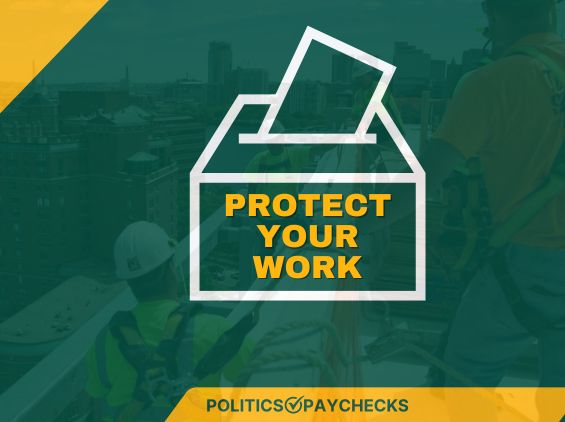
What matters to union carpenters
As builders, members of this union generally take a practical approach to things. If we don’t show up, we don’t get paid. If we don’t produce, we don’t stick around long.
It’s the same with politics. That’s why members of our union are much more likely to be registered and active voters than the general public, because they know what’s at stake.
Our union has members across the entire political spectrum who prioritize issues differently for themselves. The most important issue to a member might be the economy or gun rights. It might be health care or taxes.
While who you vote for is your choice, given the importance of politics, the union does evaluate candidates and share information with members. All members are encouraged to learn about and discuss the core issues that drive union political action. We’ve included some information below.
Davis-Bacon and State Prevailing Wage Laws
Prevailing wage refers to regulations at the state or federal level that mandate a mini-mum wage and benefit package be paid to workers on publicly funded construction. These laws level the playing field, because whether a contractor is union or non-union, they must pay the set rate for work. This allows a union employer to bid on the strength of their effectiveness in project management and their crews’ size and skill, not how low they can push wages. Davis-Bacon is the federal law that sets wages on federally funded projects throughout the country. In specific funding bills, opponents will sometimes try to exempt projects from Davis-Bacon requirements. But the UBC has built a coalition of Democratic and Republican members of Congress who support Davis-Bacon and have fought off those attempts.All of the states in our council, with the exception of New Hampshire, also have prevailing wage requirements for state-funded work. Though support for Davis-Bacon has been strong enough to protect it in Washington, it is a frequent target for some conservatives at the state level.
Payroll Fraud Enforcement
For a long time, payroll fraud has been an issue providing some non-union con-tractors a significant bidding advantage. By participating in wage theft or treating employees as 1099 employees, cheating contractors cut about 30% of their labor costs. The “savings” come from not providing workers’ compensation insurance, not making contributions to Social Security or unemployment insurance, and not withdrawing state or federal taxes. That 30% doesn’t include what they save by not providing health insurance, retirement benefits or decent hourly wages.It’s all illegal, but it continues because of a failure to commit resources to effective enforcement. The level of enforcement varies from state-to-state, even in our council. At the federal level there are some signs of interest and improvement on the issue, but there is much work to be done. Passing both state and national wage theft legislation is currently the top priority for the UBC.
Contractor Accountability
If a construction manager or general contractor is running a project and taking credit for its success, shouldn’t they be responsible for illegal activity that happens within the gates, too? The Carpenters union thinks so, which is why we’ve begun developing and passing legislation on the state level nation-wide to make general contractors liable for the wage theft and tax fraud their projects. Layering subcontractors to hide employment responsibilities is a significant factor in our industry and clearly an intentional effort to insulate general contractors. It must end and union carpenters are pushing to make it happen.
Right to Work
The most popular legislation used by anti-union activists on a broad scale is “Right to Work.” The laws allow members to “opt out” of paying union dues. With union operations, including collective bargaining, job-site servicing, organizing, contractor relations and more cut to the bone, the predicable result is that union membership plummets. This in turn leads to lower wages, benefits and safety protections for workers. States that have adopted “Right to Work” or other “free rider” provisions consistently have the lowest level of wages throughout their economies.Though there are no states in our council that currently have “Right to Work” laws, it has been proposed on several occasions in New Hampshire. It is in place in 27 states. While the UBC and our labor union partners have blocked attempts to create a national “Right to Work” legislation, if anti-union groups control enough votes in Congress–or a president gets aggressive with executive branch powers–it could become a national law.
Infrastructure Spending
One of the most directly beneficial things elected officials can do for our members is invest in infrastructure. The funding dedicated to building roads, bridges, schools, and other public facilities provides good-paying jobs to working class Americans. The products of that spending allow for new or expanded economic growth within communities and the entire country. Infrastructure spending provides a great return on the initial investment: up to 25% of additional economic growth.